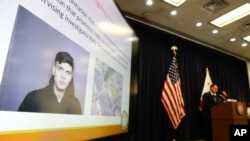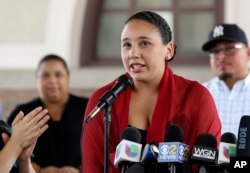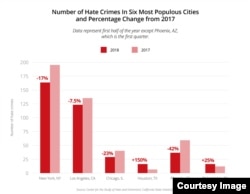After four years of sharp increases, hate crimes in most major American cities fell during the first half of 2018, preliminary police data show.
The total number of hate incidents in the country’s six most populous cities declined by nearly 15 percent from January through June, according to police department data collected by Center for the Study of Hate and Extremism at the California State University at San Bernardino.
Among the six major cities, four — New York City, Los Angeles, Chicago and Phoenix — posted sharp declines, while Houston and Philadelphia reported higher numbers. Hate crime data collected from eight other large cities showed a similarly mixed picture, with an overall slight downward trend.
The declines are significant if they hold, because they follow four years of increases in hate crimes in the nation's top 10 cities, an uptrend many experts expect to continue amid an increasingly polarized political environment and a rise in white nationalism, among other factors.
Brian Levin, director of the Center for the Study of Hate and Extremism, said it was too early to predict whether the multiyear uptrend in hate crimes would be reversed in 2018.
“The bottom line is we’re quite happy that in some cities hate crimes are down, but they’re not down in all of them and you can’t really make a full-year prediction, particularly at a time when we’re so polarized with only the half year in,” Levin said.
Levin said there is a “cyclicality” to hate crimes, with the latter quarters of the year showing a larger number of incidents. He also noted that while overall hate crimes fell in major cities, those involving violence, including assault and aggravated assault, rose.
“Hate crime laws might be making a difference, at least in the sense that some of the more minor types of hate crimes are decreasing in certain areas, while the more hard, violent ones are going up,” he said.
Cities with declines
Among the cities that saw declines in Levin's report, the number of hate crimes in New York fell to 164 incidents from 197, a decline of 17 percent. In Los Angeles, the number slipped to 124 from 134, down 7.5 percent. In Chicago, it dropped by 23 percent, from 39 incidents to 30 incidents.
Washington, D.C., reported a 17 percent increase in the number of incidents, from 72 to 84.
Julie Justicz, director of the hate crime project at the Chicago Lawyers' Committee for Civil Rights, downplayed the significance of the reported decline in Chicago and elsewhere, noting that hate crimes are notoriously underreported.
"We have continued reports of hate crimes and hate instances from people throughout the city of Chicago and surrounding suburban areas," Justicz said in an interview with VOA.
The FBI defines a hate crime as a criminal offense motivated by race, religion, disability, sexual orientation, ethnicity, gender or gender identity. Federal and state hate crime laws impose additional penalties on criminals committing offenses motivated by bias.
The surge in hate crimes in recent years has brought heightened attention on the problem, spurring federal and local officials and law enforcement authorities to promise action.
Last year, after a deadly white nationalist rally in Charlottesville, Virginia, more than 200 mayors joined the Anti-Defamation League in signing a compact “to fight hate and extremism.”
Attorney General Jeff Sessions has made combating hate crime part of his campaign against violent crime, saying in November the Justice Department “is committed to ensuring that individuals can live without fear of being a victim of violent crime based on who they are, what they believe or how they worship.”
In June, a year after it held a hate crime summit, the Justice Department reported it had indicted 32 individuals involved in hate crimes and secured the convictions of an equal number of defendants for hate crimes since President Donald Trump took office in January 2017.







